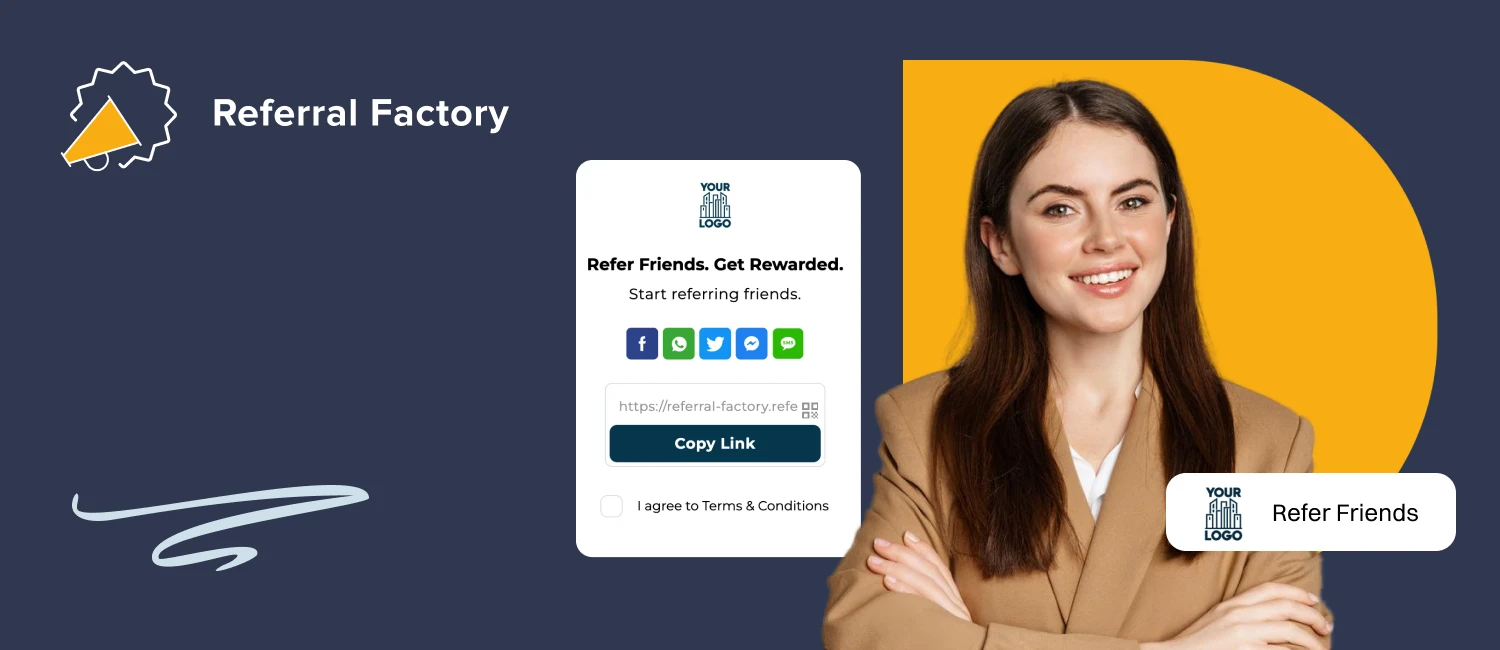Can a Small Business Have a Referral Program?
While a referral program for small businesses might sound like something scary, expensive, and complicated, it shouldn’t be like that. Sure, the life of a small business owner often feels like being a little fish in a sea of sharks. There you are, swimming against the tide, seeking a bite-sized piece of a customer while the big players grab all the glory and the spotlights. But what if we told you that, when it comes to referral marketing, being small is your superpower?
Here’s the truth: a referral program is not just a fancy concept for big players. If you’re raising an eyebrow right now, wondering how that works for a small business like yours, stick with us. By the time we’re through with this guide, not only will your skepticism fade away, but you’ll be on your tiptoes to get your own customer referral program up and running.
TLDR: If your business has more than 50 customers, you’re probably going to need referral software like Referral Factory to keep track of who referred whom — the good news is that this shouldn’t cost you more than $100/ month, and the returns are well worth the investment. Referred leads are 2x more likely to convert than leads acquired through paid marketing channels!
Table of Contents
Referral Programs 101: Your Inside Out Guide
Let’s begin with a small FAQ to make sure we are all set with the basics. If you already know the answers, feel free to skip this section.
What Is a Referral Program?
In a nutshell – imagine your customers doing your promotion for you. This is what a referral program is all about. It is a marketing strategy where businesses encourage existing customers to refer new clients to their products or services. This is what makes referral programs so effective – people trust their pals more than flashy ads.
Where Do I Start as a Small Business?
- Identify your target audience first.
- Add juicy incentives to motivate your current customers to talk.
- Think about how to promote your referral program. It can be on your website, social media, email, or good old face-to-face — or all of the above! We recommend promoting your referral campaigns through as many channels as possible.
- Be crystal clear in your communication: people should know what’s in it for them, whether they are the ones spreading the word or those being invited to try out your business.
If some of these steps seem complicated – no worries! We’ll get into more detail later in this article.
How Much Does a Referral Program Cost?
And here comes the cherry on the pie: referral programs are usually a steal compared to other marketing strategies. Against a common belief, you don’t have to offer any referral rewards until the person being referred or invited — the “friend” — converts. What is a “conversion”? You decide! Whether it is a sale, a signup, a certain period or spend, etc.
The most costly part is the actual reward. So, you have to make it affordable and reasonable. What should it be? There are two main approaches to this:
- Make your incentive cost 10x less (at most) than the lifetime value of your customer.
- Or a simpler option – make your referral reward equal to your current average cost to acquire a customer.
If you want to learn more about the recommended value, check out this detailed guide on referral rewards. As for the additional costs involved, this will depend on whether you use referral tracking software. There are multiple options for less than $100/month, which we’ll compare at the end of this article. That is if you need software at all.
Keep reading to find out how to craft and launch a referral campaign!
Why Referral Programs Work Well for Small Businesses
What if we told you that small businesses are actually even more primed to get referrals? The truth is very simple: if you know your customers personally and they know you, you are much more entrenched in the local community. This bond means that you understand their pains and needs better, making their referrals not just a shot in the dark but a bullseye. Your existing customers will be more loyal, so they’ll be more likely to spread the word and will be able to make more targeted referrals because they’ll know your business better.
Besides, there is far more space to experiment and track results more efficiently. You can try new solutions and track what’s working or not without getting lost in a sea of data. Still not convinced? Let’s check some great examples of when a strategic approach to using small business referrals proved to be even more beneficial than traditional marketing.
Real Examples of Small Businesses Running Successful Referral Programs
You can build a referral program for your small business in just one click – enter your website below and try it for yourself
Here are some small businesses that are crushing it with their referral game:
🎉 Visa Solutions is a company that connects healthcare professionals and U.S. healthcare organizations. How does their referral program work? They offer up to $500 for each friend who joins their Care For Your Dream program, deploys to the US, and works for 90 days. This is a great example of how a “conversion” can correspond to a combination of requirements.
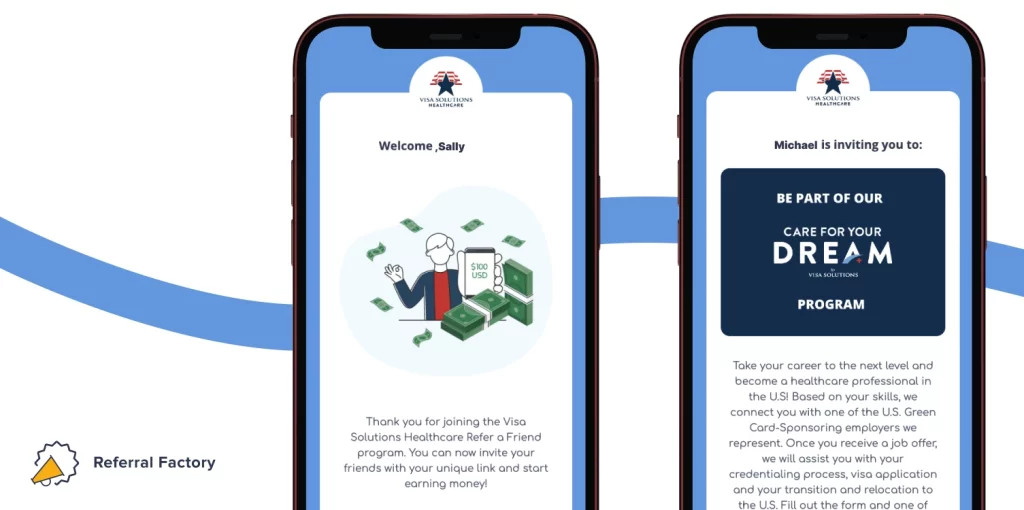
🎉 Versofy: Headquartered in Johannesburg, the company focuses on accelerating the transition to clean, reliable energy one household at a time. For their referral program, the business decided to offer a milestone or tiered referral program, where the more successful referrals you make, the more you earn! Using a milestone rewards structure can improve ongoing engagement with your referral program, especially as referrers start to see the rewards rolling in.
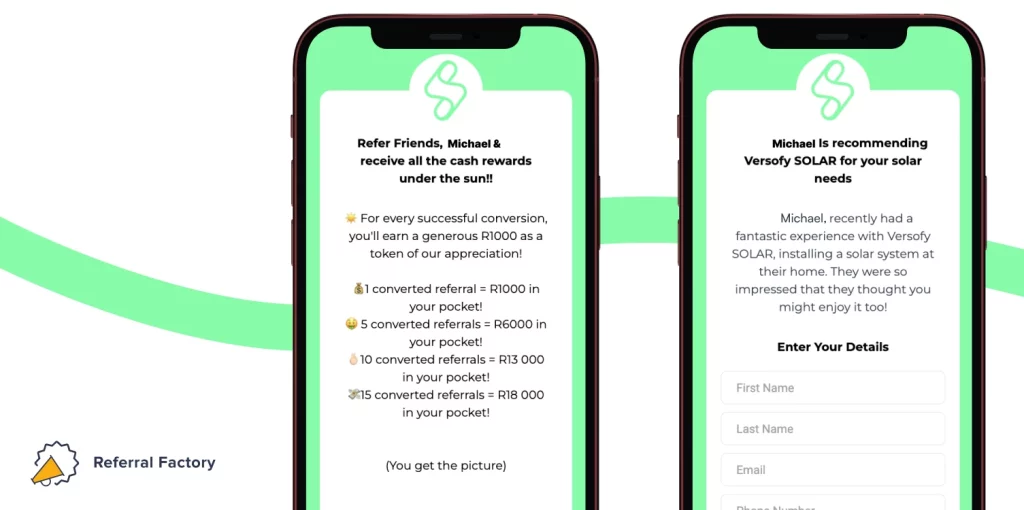
🎉 EverFence crafts custom–made fences for their clients. This is a great example of how a product business can create effective word-of-mouth marketing by using a referral program. Imagine – someone in a neighborhood installs a new beautiful fence. And then, in every small talk with their neighbors, they mention your business and share a referral link. As a result, more people get to know your product, while a client who recommends you receives a $100 Amazon Gift Card once someone installs a fence on their behalf. That’s exactly what EverFence did.
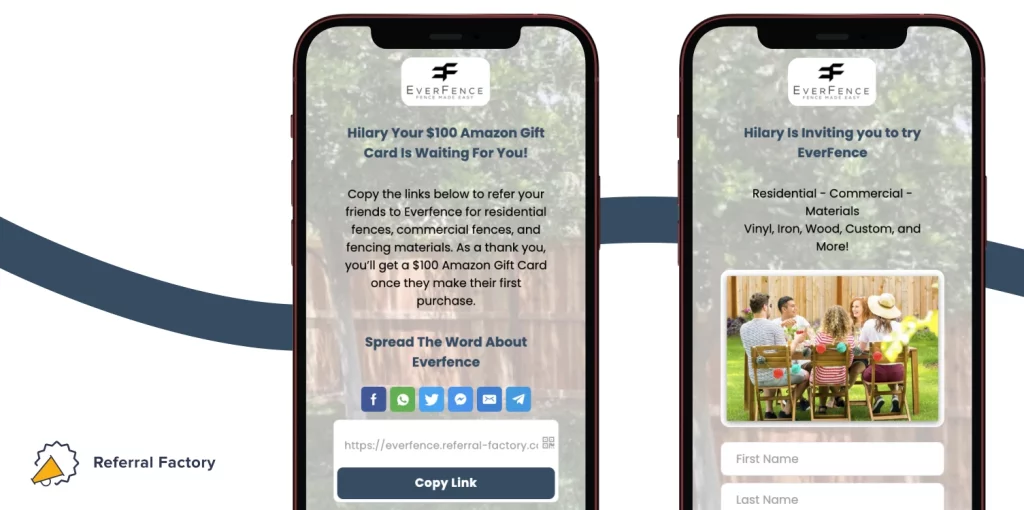
🎉 Client Needs Bookkeeping and Tax: A customer referral program has also worked for professional bookkeeping services. In their campaign, the company focused on small business owners. They offer $400 for each friend invited after they settle their first quarterly Business Activity Statement (BAS). Besides, the person invited gets a free first month of financial support. What can your small business learn from this referral campaign? That it’s best practice to reward BOTH the person referring and incentivize the person invited, which is called a “double-sided reward” in the lingo.
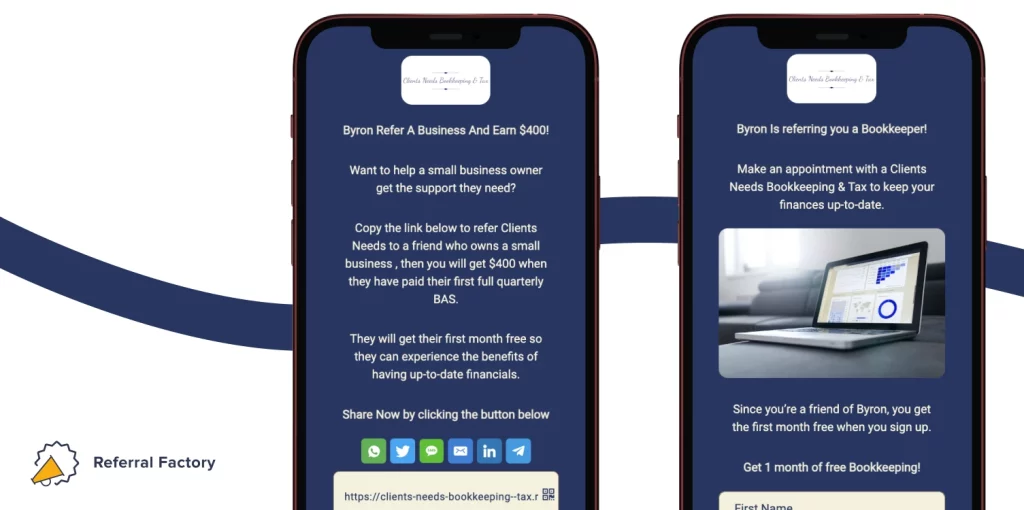
🎉 Cleanrite: This laundromat has a simple yet brilliant offer: for every 5 people who come and claim a FREE $20 laundry card at their Brooklyn location, a person referring will receive a $50 Amazon Gift Card. So, it’s a win-win for everyone. Again, the double-sided reward approach works wonders to drive more referrals and more conversions.
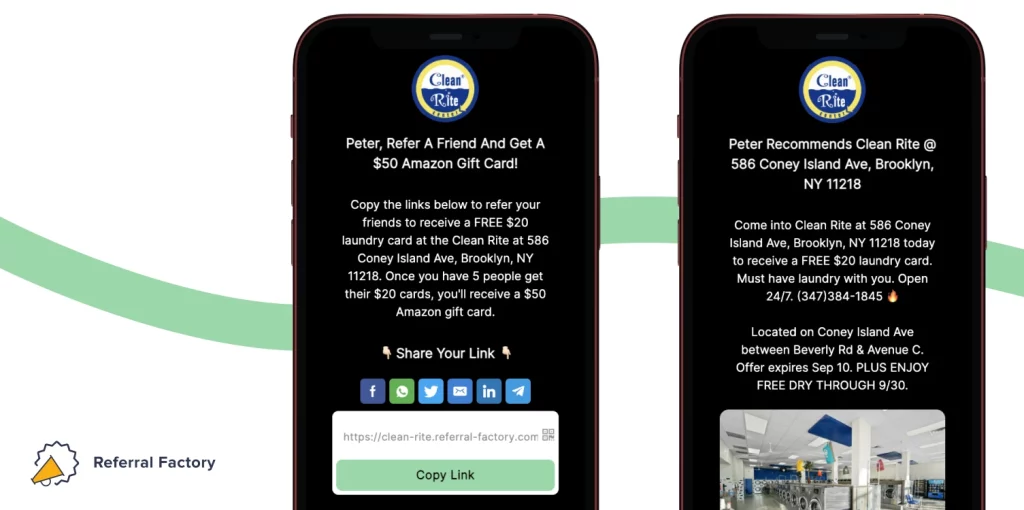
These referral programs helped businesses enhance customer growth, loyalty, and mutual benefits for both the person referring and the person invited. And as you see, you, as a business, set the rules. There is no right or wrong here. The important thing is to understand your target audience.
How to Launch an Offline Referral Program With Referral Cards (Download a Free Template)
Don’t know where to start? It is actually very simple: if you have fewer than 50 customers, one of the best solutions for you might be to run a referral program using referral cards. This is because keeping track of who referred who is still pretty easy. What’s a referral card?
A referral card is a physical card that encourages your customers to share your brand with their friends and family. This is how it works:
- You create a referral card that describes your incentive and requirements.
- You print out a stack of your referral cards and hand them out to your clients.
- They fill in their details.
- And later, hand the card to their friends or family. That’s when they become “a person referring.”
- Their friend who receives a card (we call them “a person invited”) will write their personal information and return the card to you as a business when they come to buy your products or use your services.
This way, you can easily keep track of who referred whom. It is a powerful referral marketing tactic that doesn’t require any automation or prior experience.
If you want to go further, here are a couple of pro tips:
- Take your referrals online. Physical cards are not your only choice. You can also integrate an online referral tracking system by printing QR codes on the cards. In this case, people can scan the QR code to join your referral program online and share their unique referral link with their friends.
- Get more than customer referrals. You don’t have to limit yourself to your clients alone. Your employees and partners can also participate in your referral programs!
How to Create a Referral Card?
We all know that a centerpiece of any referral card is an incentive. But what else do you need to craft referral cards that would work properly?
- Think shape: First impression is everything. Creating a referral program for small business isn’t just about discounts or rewards. You have to make people notice the card itself. Play around with the design – consider different shapes, sizes, fonts, colors, and textures.
- Create a message: Once you have their attention, hit them with a message that sticks. Add your slogan or well-written phrase that sparks curiosity.
- CTA: You still have to use the golden rule of marketing and encourage people to take action. Create a powerful CTA with a clear value proposition. Try going for something more personalized than just “Get Now.” This way, you will build better connections with your customers.
Your referral card structure shouldn’t be very tricky or inventive, just clear and engaging. Here are some referral card templates that you can edit and use for your own small business referral program:
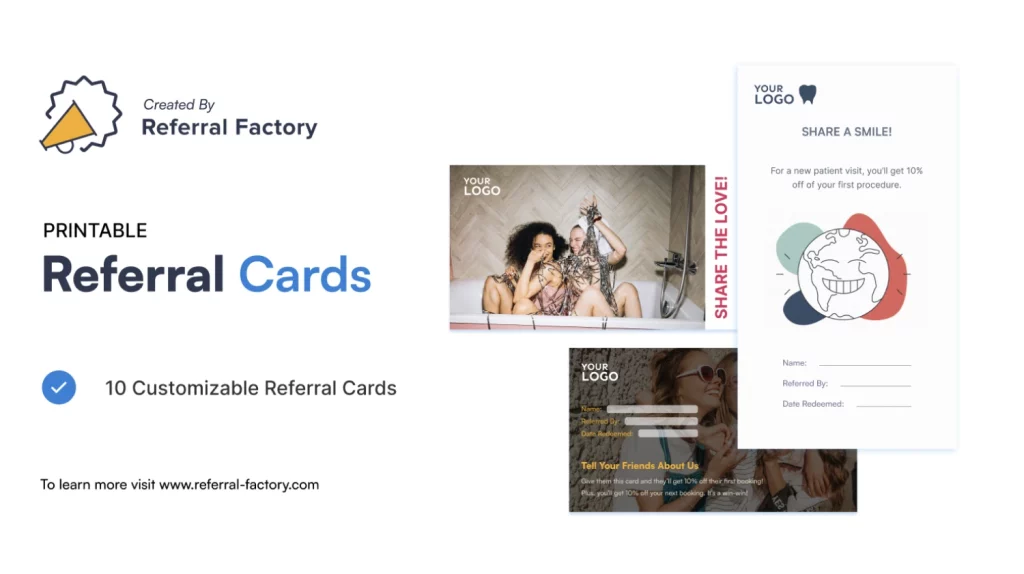
Click here to open these templates in Figma and get a referral program up and running for your small business in no time.
How to Launch an Online Referral Program as a Small Business: A Step-by-Step Guide
Now, you might be thinking, “How would I do that?” Okay, if you already have more than 50 customers and your online presence is quite strong, you’ve got everything for a solid start. Let’s check where we go from here.
Step 1: Choose the Rewards
You have all the customers you know so well right in front of you. What would make them excited? What can solve their problems? And how can you make them interested in your offer? Based on these questions, come up with referral incentives.
Take your time as you do that, and don’t be afraid to tweak your strategy. It has to be effective because an incentive is the foundation of your customer referral program. Besides, you have to decide whether you are going to reward both a person referring and a person invited or just one of them. In a nutshell, you have two options:
- Single-sided rewards. An option when either a person invited or a person referring gets a special offer from you.
- Double-sided rewards. It is a win-win when both the person invited and the person referring get rewarded. Still, they receive a reward only after a successful conversion.
Based on our experience, double-sided rewards work better in customer referral programs because everyone gets their piece of the pie.
Step 2: Decide on the Specifics
Apart from the reward itself, you have two more aspects to consider:
- When will you reward people? This refers to your definition of a “conversion.” For successful referral marketing, make sure you get more than just an email address or a lead.
- How are you going to track where new people are coming from? This might not be an issue when you have less than 50 customers, but later, you will need to use professional software to analyze all your campaigns.
Set up those, and you can move to the next step.
Step 3: Incorporate Referral Program Software
Referral marketing software will help make the entire process way smoother for both your customers and your business. It’s all about ease – easy for your customers to jump in and easy for you to handle the new leads. And you don’t even have to be a tech guru – these days, you get plug-and-play referral software that is built to be user-friendly for small business owners and digital marketers. You can build a fully automated referral program with no knowledge of coding and no development resources. Check below 👇for our guide to the best referral program software options for small businesses for under $100 per month!
Step 4: Promote Your Referral Program for Small Business
It is hard to run a successful customer referral program if your clients don’t know a thing about it. So, your goal is to spread the word and make your campaign visible. Consider promoting your referral program through social media, emails, and even printing materials. Set up a landing page where people can register for referral links and make sure to give step-by-step instructions on how to participate. And if you choose an effective referral program software, this part will end up being easier and less time-consuming.
Tips for Your Small Business Referral Program
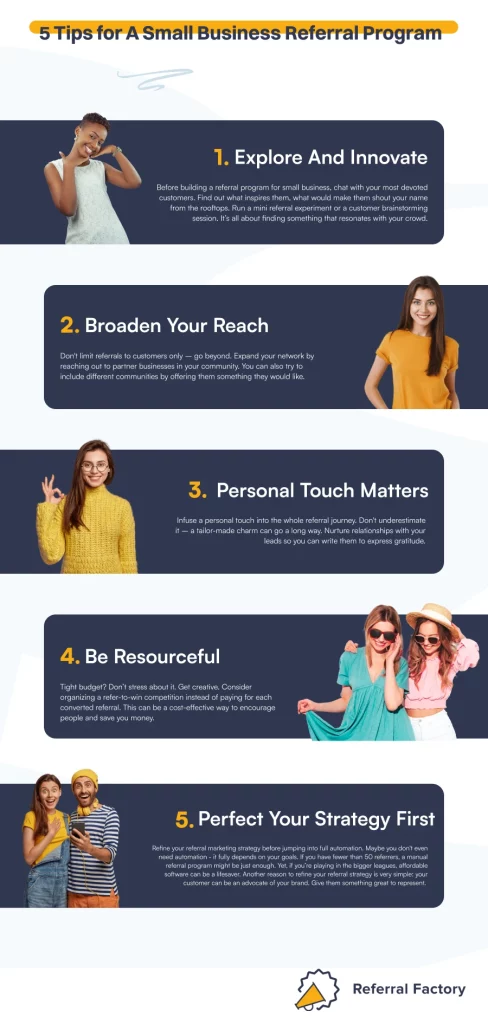
✅ Explore and innovate: Before building a referral program for small business, chat with your most devoted customers. Find out what inspires them, what would make them shout your name from the rooftops. Run a mini referral experiment or a customer brainstorming session. It’s all about finding something that resonates with your crowd.
✅ Broaden your reach: Don’t limit referrals to customers only – go beyond. Expand your network by reaching out to partner businesses in your community. You can also try to include different communities by offering them something they would like.
✅ Personal touch matters: Infuse a personal touch into the whole referral journey. Don’t underestimate it – a tailor-made charm can go a long way. Nurture relationships with your leads so you can write them to express gratitude.
✅ Be resourceful: Tight budget? Don’t stress about it. Get creative. Consider organizing a refer-to-win competition instead of paying for each converted referral. This can be a cost-effective way to encourage people and save you money.
✅ Perfect your strategy first: Refine your referral marketing strategy before jumping into full automation. Maybe you don’t even need automation – it fully depends on your goals. If you have fewer than 50 referrers, a manual referral program might be just enough. Yet, if you’re playing in the bigger leagues, affordable software can be a lifesaver. Another reason to refine your referral strategy is very simple: your customer can be an advocate of your brand. Give them something great to represent.
Best Referral Program Software for Small Businesses (Under $100/month)
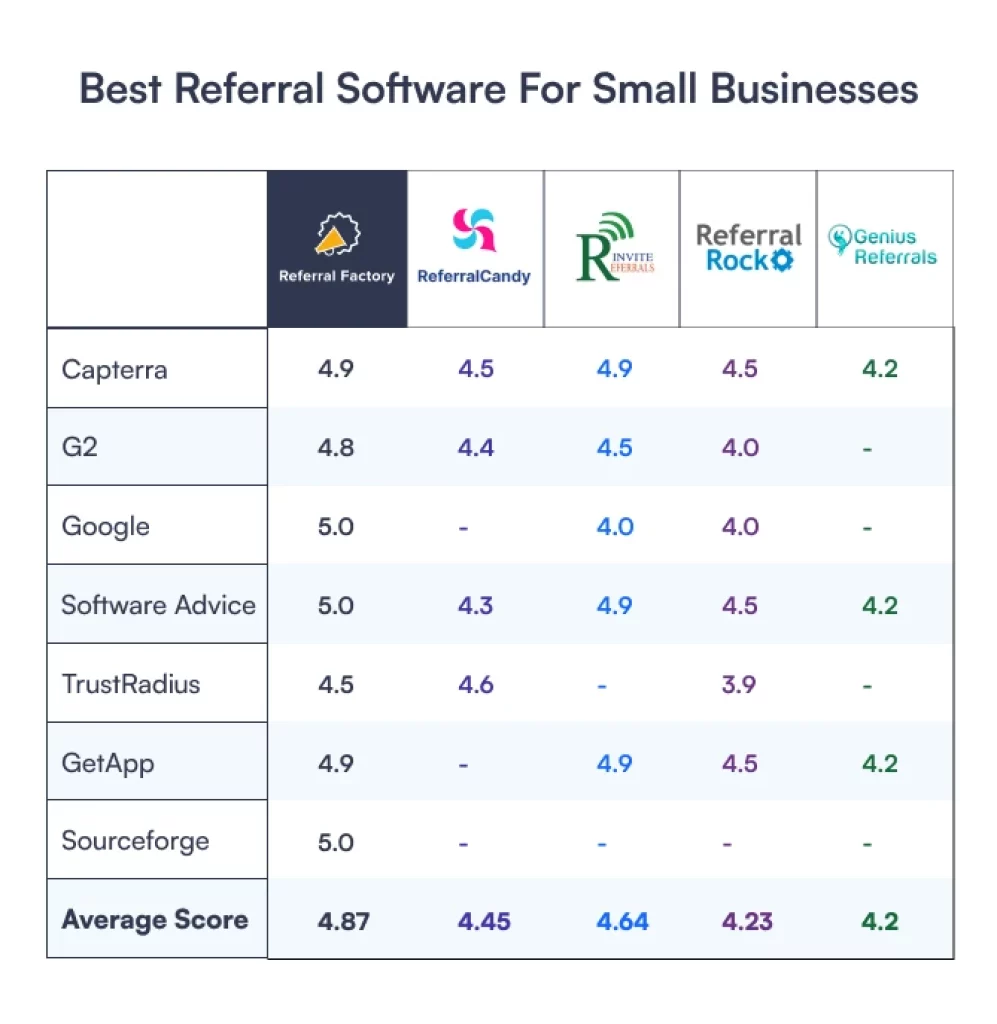
Let’s take a closer look at each of these referral program tools to help you find a perfect fit.
Referral Factory
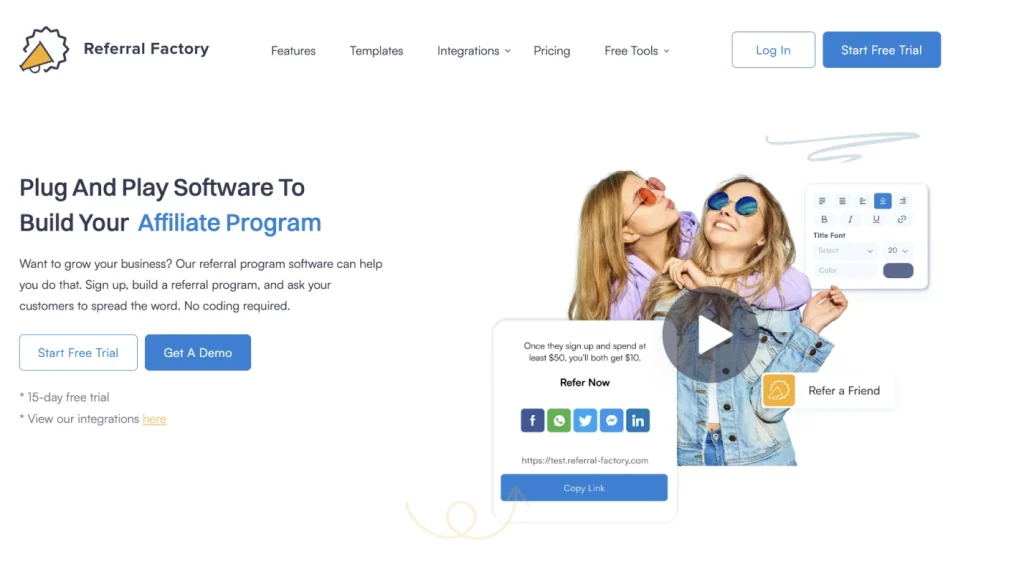
💯 Average review platform rating: 4.87
💸 Pricing range:
- Starter plan: $95/month
- Basic: $200/month
- Pro: $400/month
- Enterprise: custom (depending on the goals)
💻 Free tools: Referral calculator & Referral links generator
🎯 Main perks for small businesses:
- Easy to implement and manage multiple campaigns
- Intuitive interface
- Variety of templates to choose from
- Option to create referral programs from scratch
- Affordable pricing
- Many referral links sharing options
- Several options to integrate your referral program with the tools you already use (including Monday.com, HubSpot, Zoho, Zapier, etc.)
Referral Factory is one of the most complete tools for referral marketing. It offers everything you need to build a referral program, promote it to your customers or affiliates, and reward them for referring friends. Besides, you get native integrations with HubSpot, Salesforce, Stripe, Zoho, Zapier, and more.
Apart from affordable and versatile packages, you can use several free tools that can come in handy even if you are not sure whether you need to get paid software yet.
Referral Candy
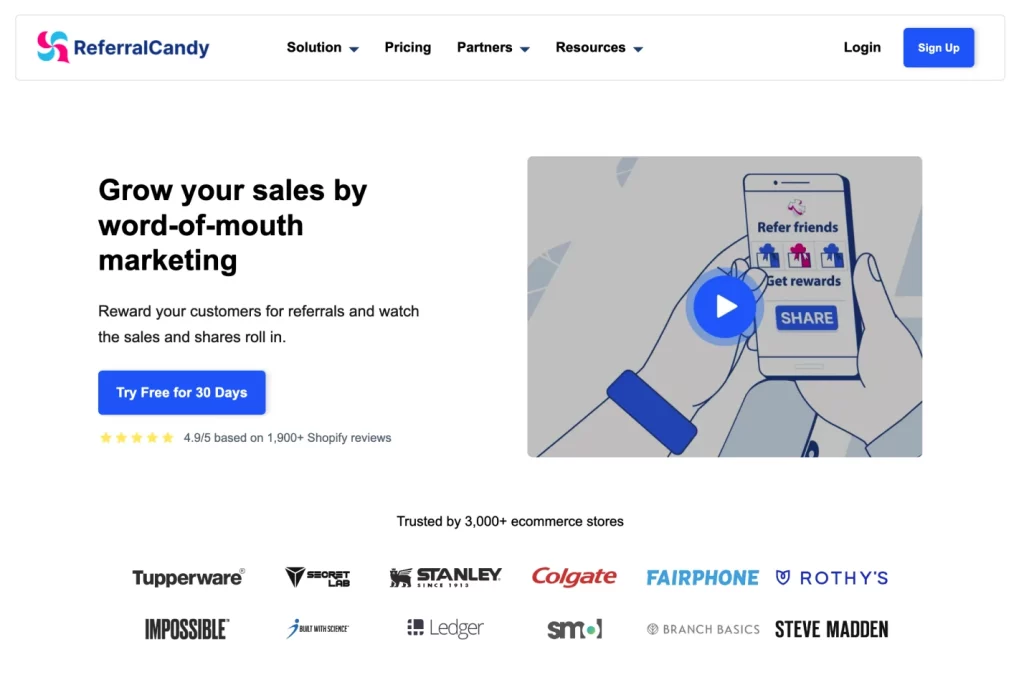
💯 Average review platform rating: 4.45
💸 Pricing range:
- Premium plan: $47/month (for small businesses)
- Plus: $239/month (for teams pushing for faster growth)
- Enterprise: negotiable
💻 Free tools: –
🎯 Main perks for small businesses:
- Audience segmentation
- Custom rewards creation
- Automated and customizable emails
ReferralCandy allows its clients to create a fully automated referral program. It primarily focuses on e-commerce businesses and has a number of integrations with e-commerce solutions, including Shopify, WooCommerce, Magento, etc. Still, you should be aware that apart from paying for your subscription, you will also have to cover a commission fee – 3.5% for the Premium plan and 1.5% for the Plus.
Invite Referrals
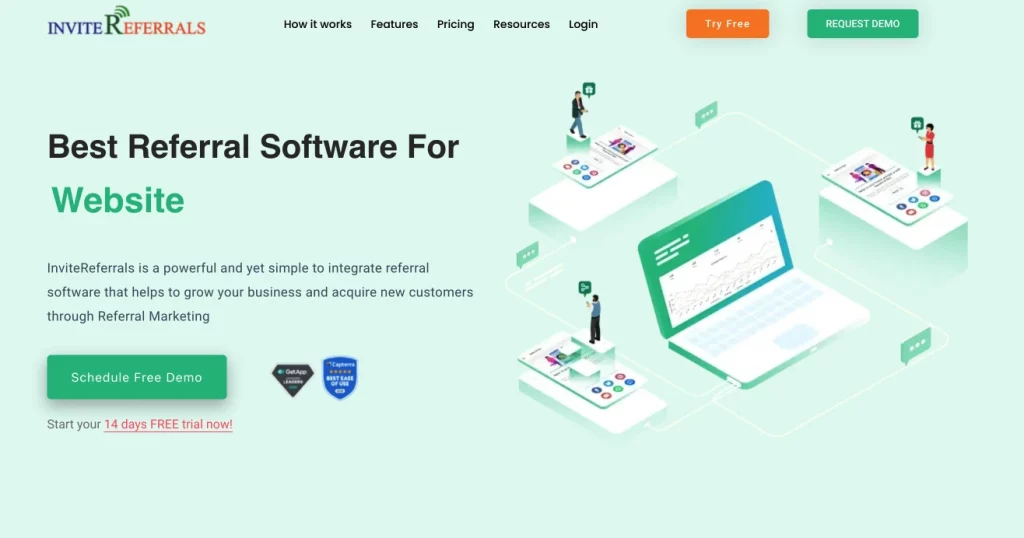
💯 Average review platform rating: 4.64
💸 Pricing range:
- Basic plan: $99/month
- Standard: $249/month
- Enterprise: negotiable
💻 Free tools: –
🎯 Main perks for small businesses:
- One-time installation
- Full automation
- Personalized coupon-based feature
Invite Referrals is another referral program software that offers a variety of referral and social media sharing options. They have in-depth analytics and fully customizable campaigns. Yet, people without a technical background might find the platform quite challenging to navigate. Besides, your customers will have to connect their Facebook accounts for referrals, which might be a hustle.
Referral Rock
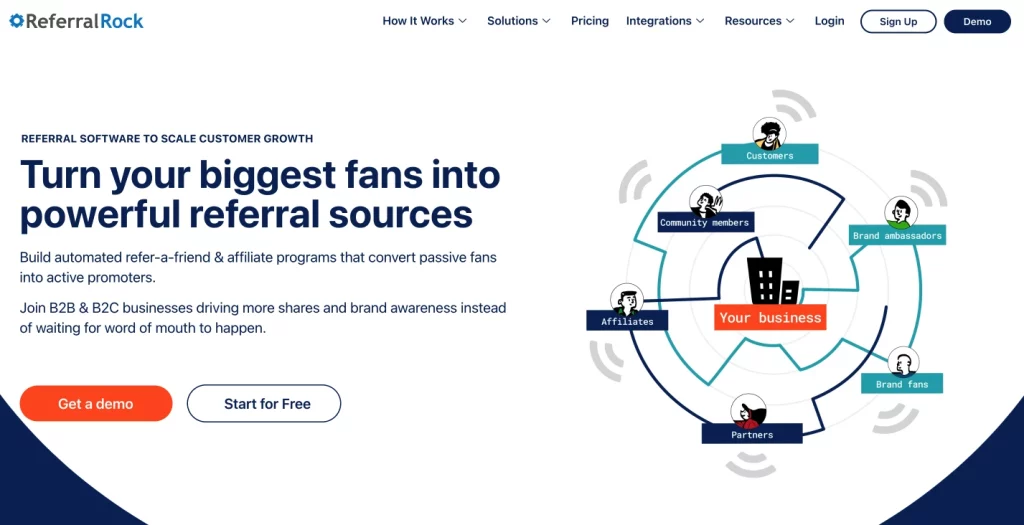
💯 Average review platform rating: 4.23
💸 Pricing range:
- Starter plan: $200/month
- Growth: $400/month
- Established businesses: $800/month
💻 Free tools: –
🎯 Main perks for small businesses:
- Advanced reward management
- Concierge onboarding services
- Personalized links embedding across email campaigns, checkout pages, and in-app experiences
Referral Rock offers a wide variety of options for different businesses in marketing referrals. The platform has integration with HubSpot, Salesforce, ActiveCampaign, Intercom, Marketo, Typeform, Pardot, and MailChimp. So, you can bring to life most of your referral program ideas. Still, as a small business, keep in mind that integrations are restricted to higher-level plans. So, the automation options are not easily available for anyone with tight budgets.
Genius Referrals
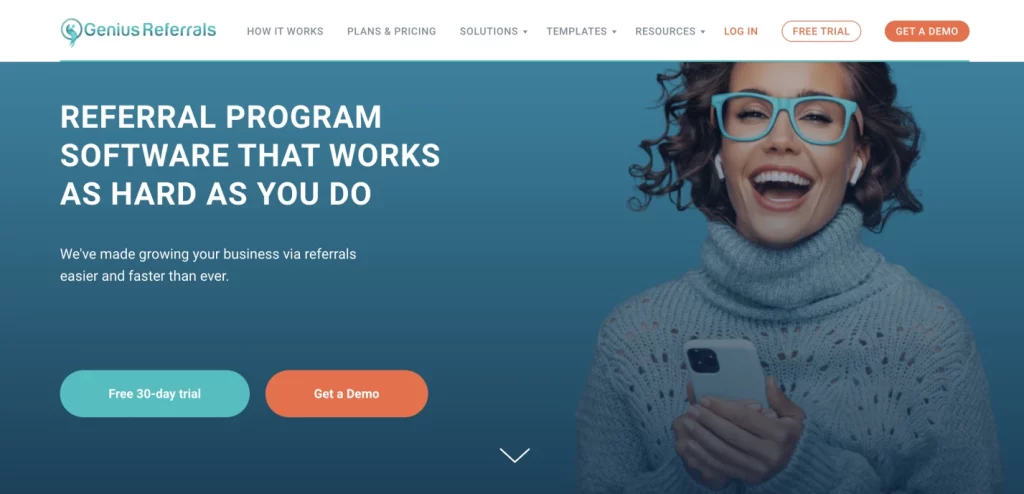
💯 Average review platform rating: 4.25
💸 Pricing range:
- Started plan: $89/month
- Silver: $219/month
- Gold: $429/month
- Platinum: $849/month
💻 Free tools: –
🎯 Main perks for small businesses:
- Personalized service
- Powerful referral tools
- Tailored tools for a variety of referral campaigns
Genius Referrals is a referral program software that offers separate options for different business types, well-tailored to their unique demands. Whether you need a solution for B2B, affiliates, influencers, or employees, you can get it. You also get quite a few integrations, from CMS and e-commerce solutions to email and billing tools. Yet, some claim that the user experience for setting up a campaign is rather complicated.
How to Track the Success of Your Referral Campaign
Another common question for anyone starting a small business referral program is – how do I know if my campaign is successful? Let’s check the most essential metrics one should track.
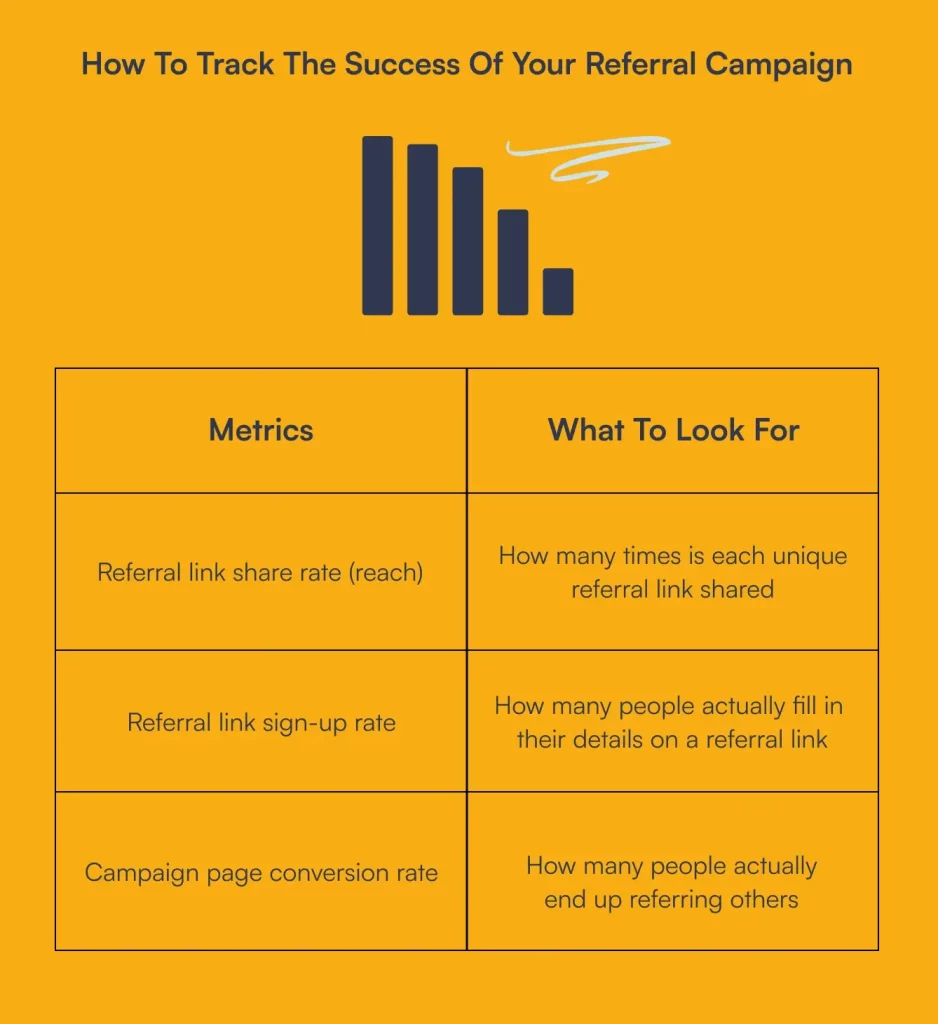
If you do choose to use referral marketing software, these metrics will be easily available so you can track the success of your referral program.
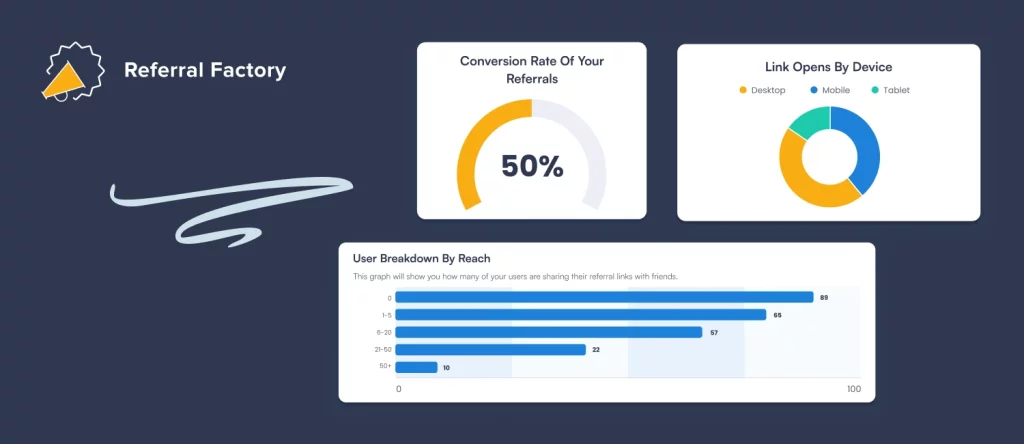
Conclusion
To run a successful referral program for a small business, you need more than just a good idea but less than a giant business. With the right campaign, your customers will become your biggest advocates, spreading the word about your brand. Besides, now that you know the best referral software to choose from, you can create a campaign in a matter of a few clicks and get new customers without breaking your wallet.

